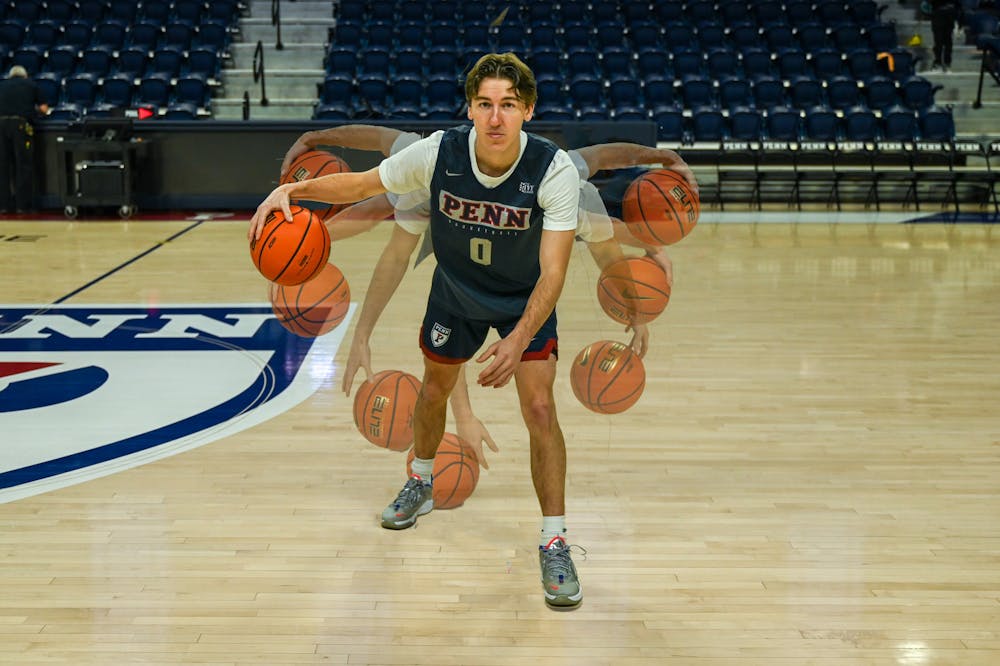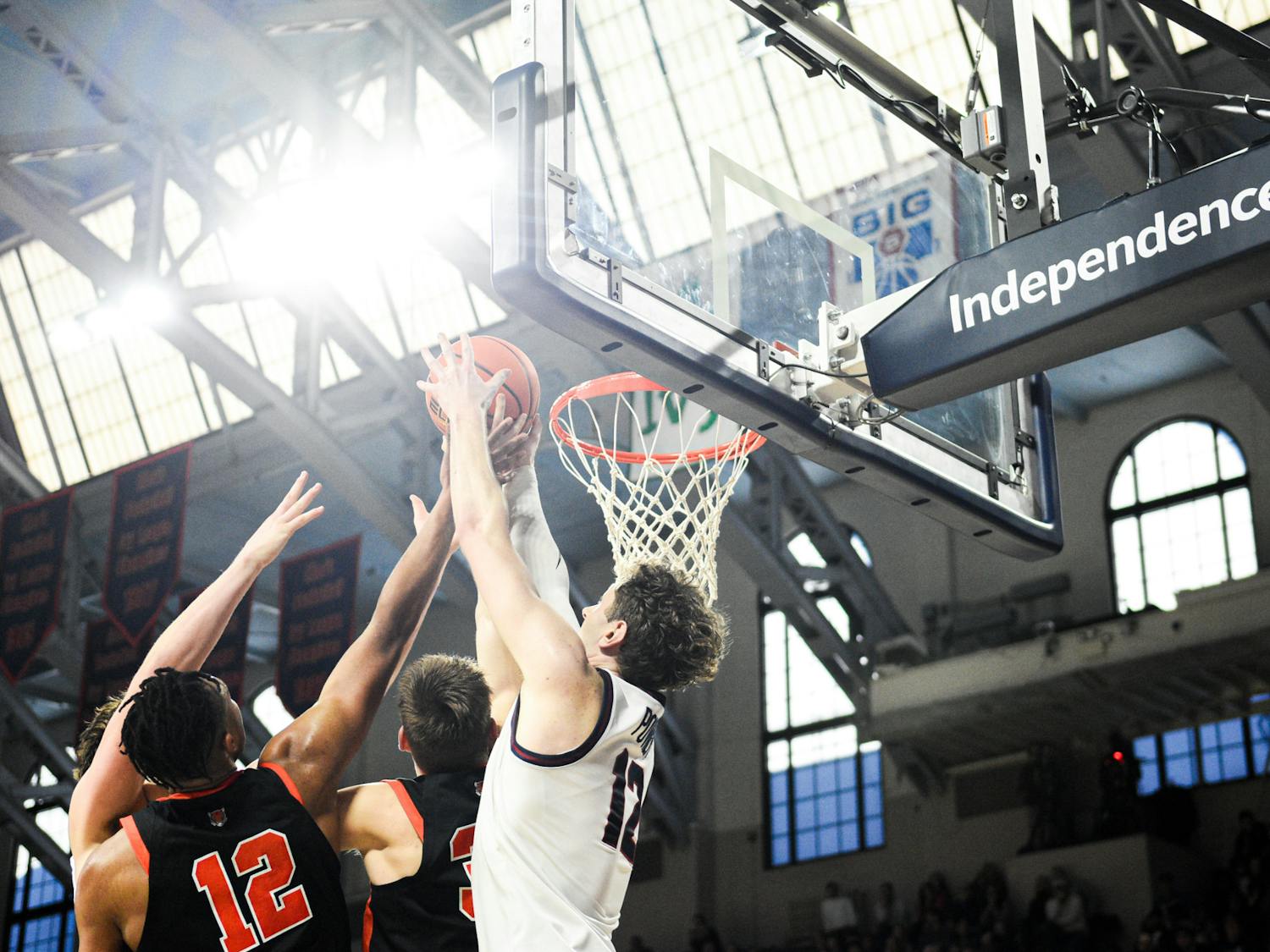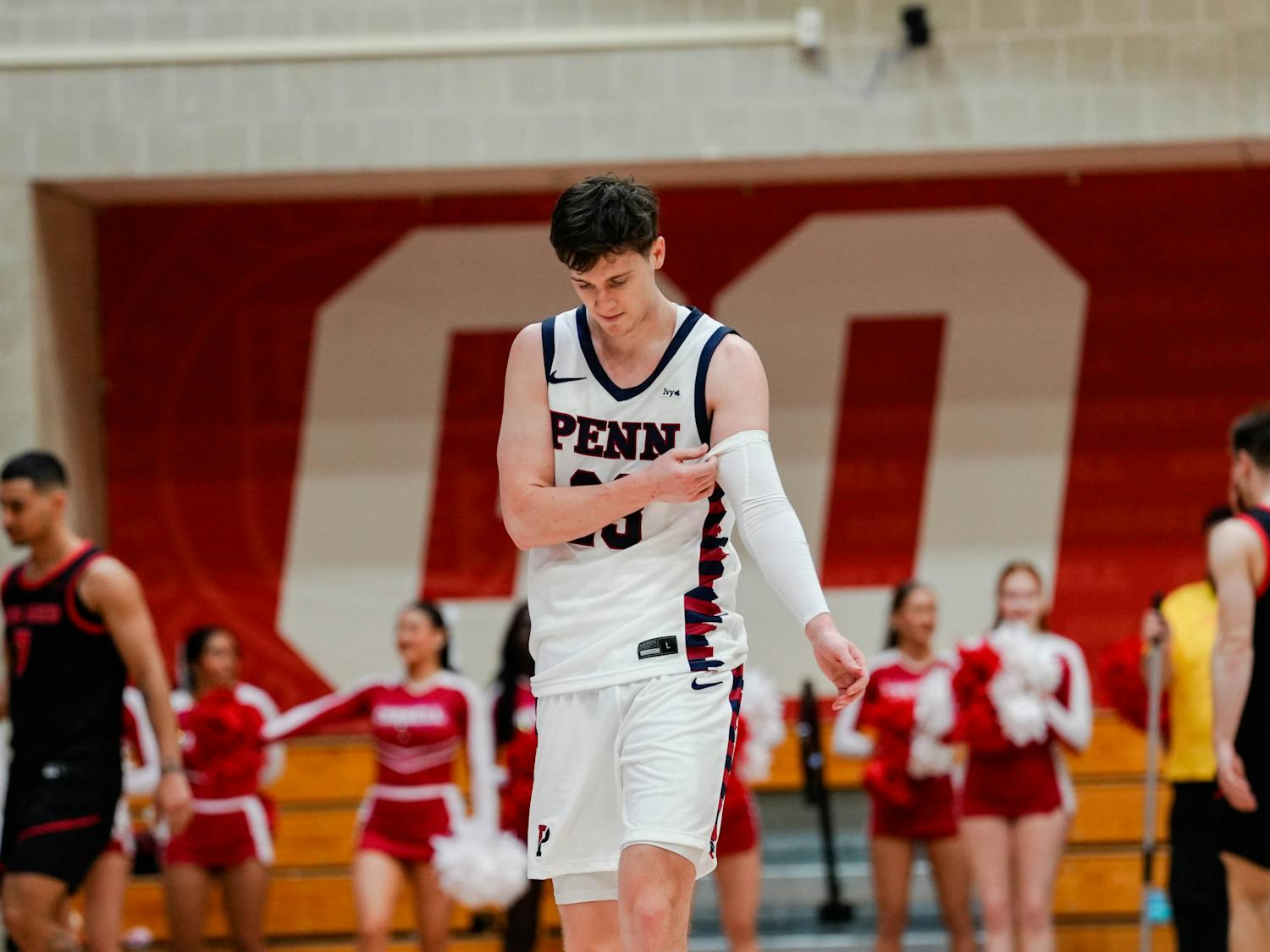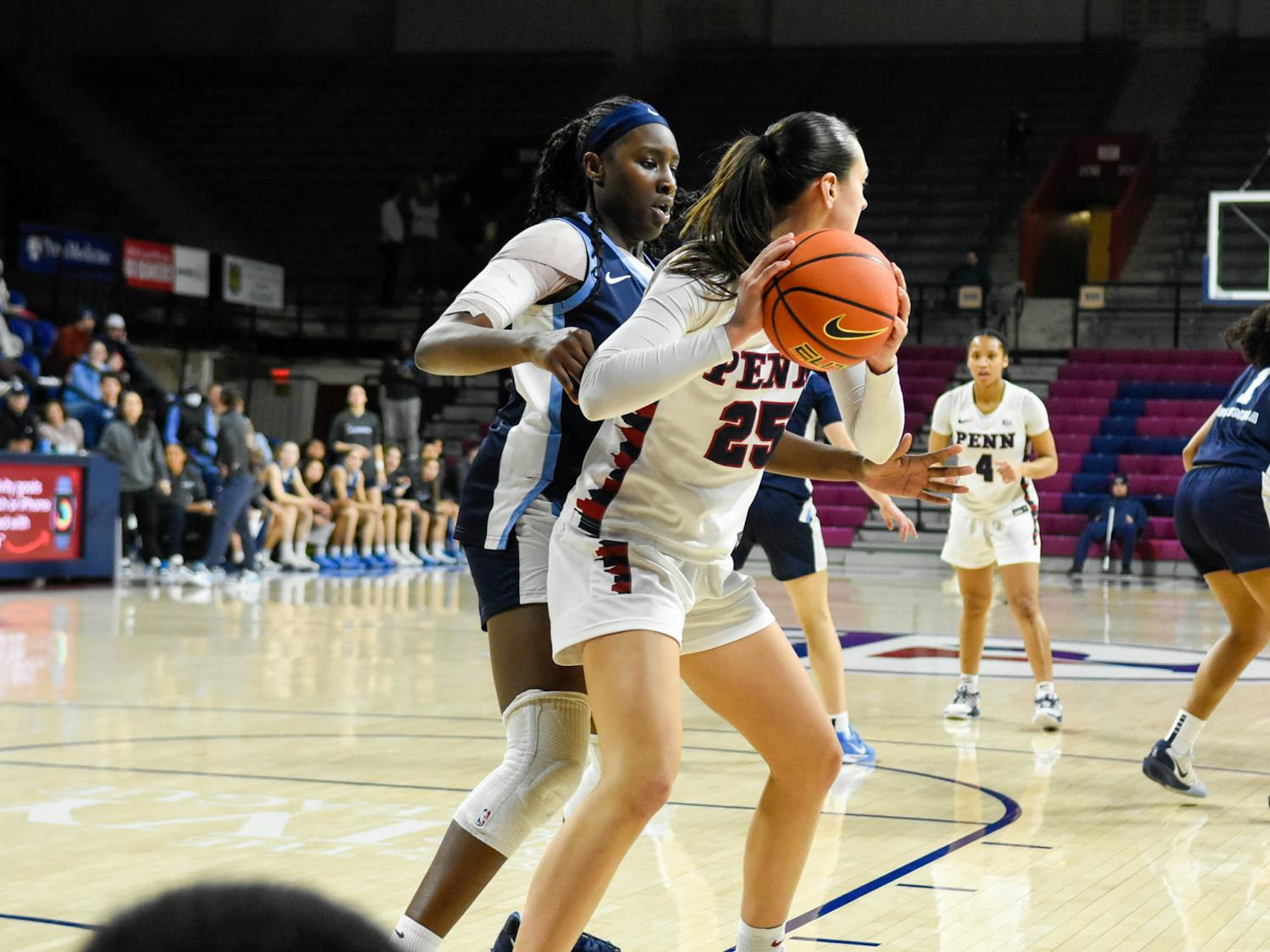It was a night like any other at the Palestra as Penn men’s basketball hosted Columbia on March 2 for one of the final Ivy League clashes of the season, a meaningless matchup for the Quakers. Except, of course, that in the sport’s most historic building, history was about to be made.
As the first half wound down, senior guard Clark Slajchert knifed into the lane for a silky floater, a move the Palestra faithful have seen him hit countless times. The basket gave Slajchert 12 points in the game, 365 on the season, and an even 1,000 for his Quaker career.
When the buzzer sounded, the Red and Blue celebrated a long-awaited home win, the kind that signified perseverance in a season marred by hardship. But the loudest cheers were for Slajchert. He was mobbed by teammates, lauded by fans, and swarmed by children asking for his autograph. Even amid such a crowning achievement, Slajchert maintained his modesty.
“I don’t think they know that I’m not that famous,” Slajchert quipped.
Famous or not, Slajchert's basketball journey has been one to remember. From Southern California to Philadelphia, from a devastating injury to 1,000 points, Slajchert has earned his Red and Blue stripes. And with his last hurrah at the Palestra on the horizon, nothing can slow him down.
In 2016, Slajchert began his journey to Palestra immortality a long way from Philadelphia — 2,740 miles away, to be exact. Even then, as a freshman at Oak Park High School in Thousand Oaks, Calif., it was evident Slajchert had something special.
“He came in as a freshman, but you wouldn’t know he’s a freshman,” Oak Park coach Aaron Shaw said of Slajchert. “He always just had that ‘it’ factor. He had ice in his veins.”
Slajchert comes from a basketball family, with his older brothers Wes and J.D. preceding him at Oak Park and going onto college careers at Dartmouth and U.C. Santa Barbara, respectively. Slajchert credits much of his competitive edge as a player to his childhood games against his brothers. But upon arriving at Oak Park, he set out to make his own legacy.
RELATED:
Strong play on both ends of the floor gives Penn men’s basketball a 84-72 revenge win over Columbia
Rivalry losing streak reaches 10 as Penn men’s basketball falls to Princeton 77-70

Senior guard Clark Slajchert poses with a basketball and a notebook on Feb. 21.
According to Wes Slajchert, Clark went for 30 points during his high school debut, while Shaw recounts several “big shots” hit by Clark during his freshman season, including a game winner in the state playoffs. Throughout his career with the Eagles, those 30-point outbursts became routine. During Slajchert’s senior season, he led the state of California in scoring with an average of 31 points per game, and finished his high school career with a total of 2,833 points, good for 17th-most in California history.
“It’s something to be said about someone who can average over 30 points per game,” Shaw said. “Every team has a plan for him every time we play a game. He sees full court, he sees traps, run and jumps — everything was thrown at him. And to be able to average and do what he did every night was just super impressive.”
Working through adverse conditions would become something of a theme throughout Slajchert’s basketball career. After leaving his mark on the Golden State, his college commitment brought him a long way from home — to a new city, a new state, a new team. But just months after setting foot in Philadelphia, Slajchert lost the very love that had brought him there.
On November 12, 2020, the Ivy League canceled all winter sports for the 2020-21 season, wiping out what would have been Slajchert’s freshman campaign. And in the spring of 2021, a swelled contusion in his quad forced Slajchert into surgery, sidelining him for much of the preparation for his sophomore year.
“It’s been such a crazy run for him,” Penn coach Steve Donahue said of Slajchert. “Because of COVID to start with, and then a severe injury during COVID.”
Despite such a catastrophic start to his time at Penn, Slajchert battled back. He averaged 12.2 points per game over his sophomore and junior seasons, and developed into one of the team’s primary offensive options last season. After the Quakers returned just two starters from 2023, it was clear that this season, the burden of leading the team would fall on Slajchert’s shoulders.
For Slajchert, it has been a role worth cherishing.
“I love this team, I love my teammates so much … so it meant a lot to me to be our leader this year,” Slajchert said. “I learned a lot from these guys. I keep learning a lot from them and our staff, and I think I can serve us best when I’m leading because I have a lot of experience. It’s been a lot of fun.”
Over the first 13 games of his senior season, Slajchert was enjoying the type of campaign he had fought so hard to have. He was averaging 18.8 points per game, the Quakers sat at 8-5, and spirits were high with the Ivy campaign on the horizon. But at that moment, with everything finally in tune, adversity struck again.

Senior guard Clark Slajchert poses with two basketballs on Feb. 21.
In a road game against then-No. 3 Houston on December 30, Slajchert rolled his ankle early in the first half and did not return. Without its lead guard, Penn was blown out by the Cougars, but the primary concern was what the injury meant for Slajchert’s availability during the Ivy League slate.
Slajchert would ultimately miss Penn’s next seven games, an absence that was devastating for team and player alike. The Quakers went just 1-6 without Slajchert, including a 1-5 clip in the Ancient Eight, and quickly sank to the bottom of the conference table. After finally being given the chance to lead the Red and Blue, Slajchert was forced to spend a pivotal part of his senior season on the sideline.
“My senior year, last time in this league, I really want to make the playoffs — I get injured. It’s frustrating,” Slajchert said. “And then when we were losing, it was really frustrating, because I know I can help, and it’s my senior year, I need to be out there to try and help us.”
Even during his time on the mend, Slajchert did his best to help motivate and push his teammates. But nothing could replicate his impact on the court. Slajchert returned from injury on February 10 against Princeton, and though the Quakers fell in the contest, the team was noticeably different with their lead guard back in action.
“A lot of it is Clark,” Donahue said of Penn’s improved performance during its game against the Tigers. “It’s having someone that’s been through it, someone that’s at the top of the scouting report that they have to worry about.”
Slajchert has continued to fight through injury and adversity throughout the final stretch of the season. Following Penn’s February 16 loss to Yale, Slajchert said the state of his ankle was still “not ideal,” but that he was “willing to play through some pain” if he still felt the team needed him.

And though the season as a whole has not gone as expected for the Quakers, the success of their senior leader is an undeniable bright spot. Penn has won two of its last four games, and Slajchert has averaged nearly 22 points per game since the loss to Yale. He was recently named Big 5 Player of the Week for the second time this season, and of course, against Columbia, became just the 43rd player in program history to score 1,000 points.
It has not been perfect for Slajchert, neither in his senior season nor throughout his basketball career. But as he looks ahead to his final game in a Penn uniform on March 9 against Princeton, one final dance at the Palestra, it is the struggles that have taught him the most.
“Don’t take it for granted,” Slajchert said of his mindset as his Quaker career draws to a close. “Being vulnerable to all that it has to offer: the game of basketball, being a part of this team. All the adversity it brings — it’s hard. And you learn from it and fight through it.”









